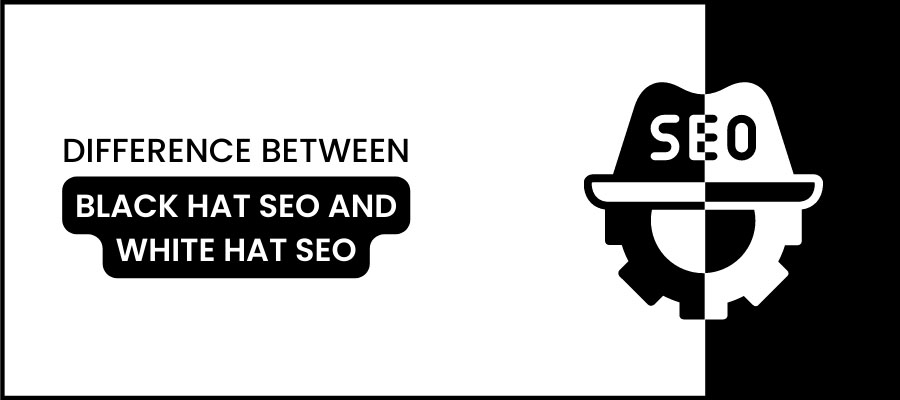Difference between Black Hat SEO and White Hat SEO

What is the difference between Black Hat SEO and White Hat SEO?
The difference between black hat SEO and white hat SEO is based on the strategy implemented to boost a website’s search engine ranking. As with any industry as large as SEO, There will be many different points of view on the best ways to approach site optimization.
Black hat SEO refers to deceptive tactics to improve ranks that are not permitted by search engines. They are in violation of current search engine standards.
The term White hat SEO refers to the use of best practices to get high search engine rankings.
What is Black Hat SEO?
Black hat SEO refers to search engine optimization tactics and strategies that violate search engine rules. Techniques used to obtain greater search ranks in an unethical manner. It focuses on “quick wins.” Many black hat SEO tactics are centered on exploiting flaws in Google’s algorithm that can lead to rankings improvements with little effort. While some of these strategies can create effects, they are virtually always transitory.
That’s because Google’s algorithm is always being improved in order to deliver the best results to searchers and to prevent site owners who don’t provide a great site experience from ranking well. This means that sites applying black hat tactics are at risk of losing rankings with each new algorithm change, making this a considerably more short-term strategy than white hat SEO.
The following actions may result in consequences:
- Cloaking (The practice of displaying various material or URLs to human users and search engines)
- Keyword Stuffing (Long lists of keywords without proper formation)
- Hidden text or links (Keywords placed in white font on a white background to attract search engine crawlers)
- Spamdexing (The technique of repeating irrelevant phrases in order to alter the relevancy or prominence of search engine-indexed resources)
What is White Hat SEO?
White Hat SEO focuses on providing content for users rather than search engines. Its primary goal is to increase accessibility. White hat SEO not only complies with all SEO principles but also assures that all information indexed by search engines is the same as what a human user sees. It emphasizes readability, content relevance, and well-structured and well-written information that will be valuable to those who read it.
It also focuses on cross-linking pages within a website where suitable, as well as generating relevant inbound connections from reputable sources. As long as you keep your visitors in mind when you work on your site and make improvements to provide them with a better browsing experience, you can be confident that your SEO approach is in compliance with Google’s recommendations.
This means that tactics like quality content, well-labeled images, increasing page speed, improving user experience, and working towards mobile-friendliness are all considered white hat — and are the types of changes that will have a lasting, positive impact on your rankings.
- Quality content
- Well-labeled images
- Unique and relevant page title
- Create pages that are intended for users, not search engines.
White hat SEO vs Black hat SEO: What’s the Difference?
The primary distinction between these two tactics is that white hat SEO adheres to Google’s criteria and improves user experience, whereas black hat SEO breaches those guidelines and is often performed with full contempt for human users.
Given the fundamental differences between black Hat SEO and White Hat SEO, it should come as no surprise that there is very little overlap in the exact SEO techniques.
Is Link Building a Form of Black Hat SEO?
The question that many website owners have is if link building is considered black hat SEO.
After all, most website owners build links merely to improve their rankings. They have no effect on user experience and serve only to increase a site’s trustworthiness with search engines.
Is this to say you shouldn’t try to get connections to your site?
Fortunately, the answer is no — but you need to exercise caution in your techniques.
According to Google’s standards, you should not participate in link schemes or affiliate programs that do not provide value. You should also never attempt to buy links.
Taking steps to obtain them, however, is not an inherently black hat practice as long as you are not seeking to manipulate Google’s algorithm with spammy, artificial links.
Conclusion
As you investigate the best methods for site optimization, you may come into a dispute between white hat SEO and black hat SEO. And if it happens, keep in mind that this debate isn’t worth your attention.
As a digital marketer, you must, without a doubt, use white hat methods. If somebody attempts to persuade you otherwise, don’t listen. Black hat approaches may assist site owners in attaining fast gains, but they rely on deceptive tactics that are clearly in violation of Google’s standards and will eventually lead to penalization.
White hat SEO, on the other hand, requires a long-term commitment, focuses on humans, and follows Google’s guidelines – all of which have a positive and long-term impact on your results.
Refer to the video for further information on Black hat SEO and white hat SEO.
Hope you liked this comparison of White hat SEO vs Black hat SEO stay tuned for our later blogs
